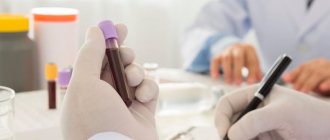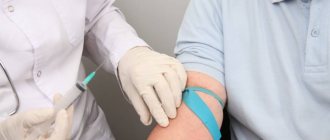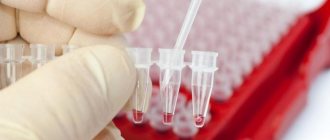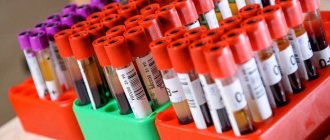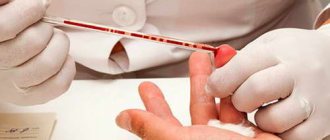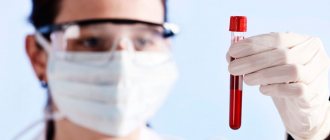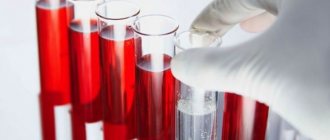Synonyms: Antibodies to thyroid peroxidase, AT-TPO, microsomal antibodies, anti-thyroid, antibodies to microsomal antigen, ATPO.
Scientific editor: M. Merkusheva, PSPbSMU named after. acad. Pavlova, medical practice. Proofreader: M. Mazur, KSMU named after. S. I. Georgievsky, therapist
The thyroid gland plays a responsible role in the body - the production of biologically active substances that are responsible for the process of energy exchange between cells. Their secretion occurs with the participation of a special enzyme - thyroid peroxidase (TPO), it is involved in the formation of the active form of iodine, without which the biochemical synthesis of thyroid hormones T4 and T3 is impossible.
Antibodies (AT) to TPO are formed when the enzyme is detected by the body as a foreign protein. The AT-TPO analysis is a highly accurate marker that determines the level of aggression of the immune system towards its own body, and allows for timely diagnosis of autoimmune diseases of the thyroid gland: diffuse toxic goiter, thyroiditis, thyroid dysfunction in infants.
General information
To thyroid peroxidase, which is located on the surface of thyrocytes (cells that produce T3 and T4), i.e. directly in the thyroid gland, the immune system does not react in any way. But only up to a certain point. When this enzyme enters the blood, and this happens in the case of damage to the thyroid gland, provoked by external or internal factors, the active synthesis of autoantibodies to peroxidase (AT-TPO) begins in the body.
Provoking factors:
- radiation therapy (in the treatment of cancer), systematic irradiation of the body (occupational hazard);
- trauma to the thyroid gland as a result of a bruise, blow, fall, puncture, etc.;
- unsuccessful surgical intervention on the gland;
- deficiency or excess of iodine in the body;
- inflammatory processes, infectious and viral diseases.
When the amount of antibodies increases, massive destruction of peroxidase and thyroid follicular cells secreting T3 and T4 begins. As a result, the concentration of these hormones in the blood increases sharply. This condition is diagnosed as autoimmune thyrotoxicosis. Then, over the course of 1.5-2 months, T3 and T4 are washed out of the body, and their levels in the blood drop. At the same time, there is no possibility of replenishing the hormone deficiency, because the cells that produce them are completely destroyed. Hypothyroidism develops.
If the amount of AT has increased moderately, then over the course of decades they will gradually destroy thyroid cells and gradually reduce the volume of hormones produced. As a result, the patient will develop insufficient thyroid function, and there will be a deficiency of the most important iodinated hormones (T3 and T4). This is the same hypothyroidism.
The AT-TPO test makes it possible to accurately diagnose pathological conditions, the correction of which requires the use of hormone replacement therapy (HRT). With the correct dosage of synthetic hormones (levothyroxine), such treatment tactics provide a stable and long-lasting clinical effect.
Blood test for free thyroxine
What it is. A venous blood test in which the concentration of free thyroxine (T4) is determined in the sample. Most often, an analysis is prescribed if the TSH test results are higher or lower than normal.
According to Zili Kalmykova, T4 is a hormone produced by the thyroid gland itself. It increases the speed of many cellular metabolic reactions - for example, the breakdown of fats and carbohydrate metabolism.
How it works. Information about how much free T4 a person has in his blood allows us to clarify the stage of the disease. In the body, T4 is present in two forms: inactive, that is, associated with the protein thyroxine binding globulin (TBG), and active, that is, not associated with TSG. Free T4 analysis is prescribed for a more detailed assessment of thyroid status. For example, to diagnose hypothyroidism or hyperthyroidism syndrome.
Why is it prescribed? To figure out whether a person is sick or is just at risk. For example, if a person has an elevated TSH level but a normal T4 level, then he or she is at risk of developing hypothyroidism. And if he has a high TSH level and a low T4 level, the disease has already developed.
How to understand the results. Both in our country and abroad, the norm for free T4 is 12-30 pmol/l. However, a person may have symptoms of hyperthyroidism or hypothyroidism even if free T4 is within normal limits. To avoid mistakes, this analysis is usually prescribed together with TSH - it turns out to be much more informative.
What test results may indicate:
- TSH is slightly elevated, but free T4 is normal - mild thyroid deficiency, which can develop into hypothyroidism. As a rule, in this situation, an additional test for antibodies to the thyroid gland is prescribed. This allows you to understand whether a person needs immediate treatment.
- TSH is high, free T4 is low - hypothyroidism requiring treatment.
- TSH is low, free T4 is low - secondary hypothyroidism associated with insufficiency of the pituitary gland, or the result of a serious disease not related to the thyroid gland.
- TSH is low, free T4 is high - hyperthyroidism requiring treatment.
If desired, anyone who is interested in the health of their thyroid gland can take a TSH and T4 test. It is important to remember that you cannot diagnose yourself, much less prescribe treatment, on your own.
In addition, both hypothyroidism and hyperthyroidism can have many causes - from a lack or, on the contrary, excess of iodine in food to tumors or autoimmune diseases. Only a doctor can figure out what exactly is happening to the patient during a personal appointment.
Indications for analysis
In addition to direct indications (diagnosis of autoimmune thyroid diseases), an endocrinologist may prescribe an anti-TPO antibody test in the following cases:
- when the patient complains of: uncontrolled weight gain or loss, chronic fatigue, constantly low or, conversely, increased body temperature, increased sweating, increased anxiety, insomnia.
- if the results of other tests (T3, T4 and/or TSH) indicate thyroid dysfunction.
- determining the risk of neonatal hypothyroidism (thyroid deficiency in newborns), if the mother has a history of thyroid disease or antibodies to TPO are detected;
- screening in the first trimester of pregnancy to determine the risk of developing thyroiditis (inflammation of the thyroid gland);
- screening in pregnant women with TSH (thyroid-stimulating hormone) concentration >2.5;
- determination of the degree of risk of miscarriage, spontaneous termination of pregnancy (miscarriage);
- diagnosis of female infertility and unsuccessful attempts at artificial insemination;
- assessment of the structure and condition of the thyroid gland before prescribing medications (HRT, amiodarone, interferon, lithium or iodine preparations, etc.);
- diagnosis of hypothyroidism, goiter (enlargement of the gland), thyroiditis, thyrotoxicosis (excessive secretion of iodinated hormones);
- clarification of ultrasound results that revealed a disorder of the structure (heterogeneity) of the thyroid gland;
- to examine the thyroid gland in newborns to ensure that there are no abnormalities if the mother has been diagnosed with antibodies to thyroid peroxidase or postpartum thyroiditis.
Detailed description of the study
Thyroid peroxidase is a glycoprotein enzyme found in the epithelial cells of the thyroid follicles. It carries out the oxidation of iodides to “active” iodine and iodination of tyrosine, subsequently the precursors of thyroid hormones are formed (T4 predominates). Determination of the level of autoantibodies to thyroid peroxidase is used as a marker of autoimmune diseases of the thyroid gland, as an indicator of the risk of developing postpartum thyroiditis. Thyroid function decreases mainly due to decreased T4 secretion.
Antibodies to thyroid peroxidase are specific immunoglobulins directed against the enzyme contained in the cells of the thyroid gland and responsible for the formation of the active form of iodine for the synthesis of thyroid hormones. They are a specific marker of autoimmune thyroid diseases. The thyroid enzyme thyroid peroxidase plays a key role in the formation of thyroid hormones. Thyroid peroxidase is involved in the formation of the active form of iodine, without which the biochemical synthesis of thyroid hormones T4 and T3 is impossible. The appearance of antibodies to this enzyme in the blood disrupts its normal function, resulting in a decrease in the production of the corresponding hormones. Hypothyroidism manifests itself in the form of symptoms such as weight gain, goiter, dry skin, hair loss, constipation, and increased sensitivity to cold. Hyperthyroidism is accompanied by sweating, rapid heartbeat, anxiety, tremors in the limbs, weakness, sleep disturbances, weight loss, and exophthalmos. Thyroid peroxidase antibodies are the most sensitive test for detecting autoimmune thyroid disease. Usually their appearance is the first shift that is observed in the course of developing hypothyroidism due to Hashimoto's thyroiditis. Detection of AT-TPO during pregnancy indicates the risk of developing postpartum thyroiditis in the mother and a possible impact on the development of the child.
AT-TPO test for pregnant women
Sometimes an increase in AT-TPO occurs during pregnancy, during the restructuring of the immune system for bearing a fetus. At this time, the thyroid gland becomes more active, producing more hormones. This is sometimes regarded by the immune system as a disorder and promotes the synthesis of antibodies to TPO.
Testing for antibodies to thyroid peroxidase during pregnancy is carried out for expectant mothers for preventive purposes. If the concentration of antibodies to TPO is high, then the risk of developing postpartum thyroiditis increases by 50%.
According to statistics, pathology develops in 5-10% of women after childbirth. The thyroid gland is gradually destroyed under the influence of AT, after which thyrotoxicosis develops (oversaturation of the body with iodinated hormones). Sometimes the function of the gland is restored on its own, but 1/3 of patients may develop hypothyroidism - chronic hormone deficiency, which requires systematic use of hormonal medications.
If the level of other thyroid hormones (T3, T4, TSH) is elevated in the first trimester, then the endocrinologist prescribes an AT-TPO test.
During pregnancy, antibodies to TPO can significantly affect the development of the thyroid gland of the unborn child, since they are able to penetrate the placental barrier from the mother’s blood into the fetus’s body and cause neonatal hypothyroidism.
Important! The interpretation of the results is always carried out comprehensively. It is impossible to make an accurate diagnosis based on only one analysis.
Diseases of the thyroid gland that require testing for elevated thyroglobulin
An analysis for elevated thyroglobulin is done in the following cases:
• For thyroid carcinoma. But it should be remembered that only a third of patients with thyroid cancer have an increase in the concentration of this protein;
• For the purpose of early detection of metastases or relapses of tumors after surgical treatment has already been performed. A relapse of both malignant and benign thyroid tumors may be indicated by increased thyroglobulin in the blood plasma;
• Determination of the effectiveness of radioactive iodine therapy for the metastatic process in thyroid tumors;
• For the diagnosis of artificial thyrotoxicosis (against the background of hormone replacement treatment);
• Thyroglobulin, the norm of which is increased, is assessed in children to determine the origin of congenital hyperfunction of the thyroid gland;
• As a tumor marker and a means for assessing the effectiveness of treatment of thyroid tumors;
• To assess the activity of thyroiditis or confirm previous inflammation of the thyroid gland in the next 2 years;
• For mass studies in conditions of iodine deficiency.
Standard for AT-TPO
All endocrinological studies (instrumental and laboratory) must be carried out in the same medical institution, since the reference values of AT-TPO in different laboratories may be different.
- According to the independent laboratory Invitro, for antibodies to thyroid peroxidase the indicator is set to 5.6 U/ml.
Standard reference values
The generally accepted norm (including abroad) is the indicator
- 0-34 IU/ml
However, there are also extended reference intervals:
Women:
- up to 50 years – 0-34 IU/ml.;
- after 50 years – 0-100 IU/ml;
Pregnant:
- at the 12th week of pregnancy – no higher than 25 IU/ml;
- in the 2nd and 3rd trimester - from 30 IU/ml to 56 IU/ml;
Men:
- up to 50 years - 0-34 IU/ml;
- after 50 years - less than 85 IU/ml.
Blood test for total triiodothyronine (T3)
What it is. A venous blood test in which the concentration of total triiodothyronine (T3) is determined in a sample. As a rule, the test is prescribed along with TSH and T4 to clarify whether a person has hyperthyroidism.
Zilya Kalmykova says that T3 is a hormone very similar to T4 in its functions, but at the same time it is 3-4 times more active, so it is produced 10 times less. A test for total T3 is prescribed to assess the thyroid status in detail.
How it works. Like T4, T3 exists in the body in free and bound forms. But since there is little of it, in laboratory practice both forms are determined at once - this is called total triiodothyronine. And since there is less total T3 in the body, fluctuations in its level in some cases can provide more information than a test for free T4.
Why is it prescribed? To figure out whether a person has hyperthyroidism or not. There are situations when a patient has symptoms of hyperthyroidism - rapid heartbeat, weight loss, trembling and sweating, tests show low TSH levels, but free T4 is normal. To clarify what is happening to a person, the patient is prescribed a test for free T3.
How to understand the results. Abroad, the norm for total T3 is 1.1-2.6 nmol/l. In our country, the norm is wider - 1.23-3.0 nmol/l. By themselves, these indicators say almost nothing. You need to evaluate the result of the analysis based on the results of tests for TSH and free T4.
If a person has symptoms of hyperthyroidism, with a low TSH level and normal free T4, but:
- T3 is higher than normal - most likely, he still has hyperthyroidism
- T3 is normal - most likely there is no hyperthyroidism, and the symptoms are associated with other causes.
AT-TPO is higher than normal
A significant deviation of the results from the norm is typical for:
- diffuse toxic goiter (Graves disease);
- nodular toxic goiter;
- thyroiditis (autoimmune, subacute (de Crevin's disease), chronic (Hashimoto's disease));
- postpartum thyroid dysfunction;
- idiopathic hypothyroidism;
A slight or moderate increase in AT-TPO levels may indicate the presence of:
- diabetes mellitus (insulin-dependent);
- rheumatoid arthritis (damage to joints and connective tissue);
- lupus erythematosus (an autoimmune pathology that affects connective tissue and skin);
- vasculitis (damage to vascular walls) and other autoimmune diseases.
Increase in AT-TPO during pregnancy
- Positive test results during pregnancy indicate the possibility of hyperthyroidism in the child (during intrauterine development or after birth)
The following factors can cause a false increase in AT-TPO:
- hereditary predisposition;
- a course of treatment with iodine or other drugs;
- chronic diseases in the acute stage;
- trauma or surgery in the thyroid gland.
For reference: about 5% of the world's population suffers from autoimmune thyroid diseases. This is about 350 million patients. In 10% of the remaining antibodies to TPO can be elevated without affecting the gland or caused by other systemic and autoimmune processes.


